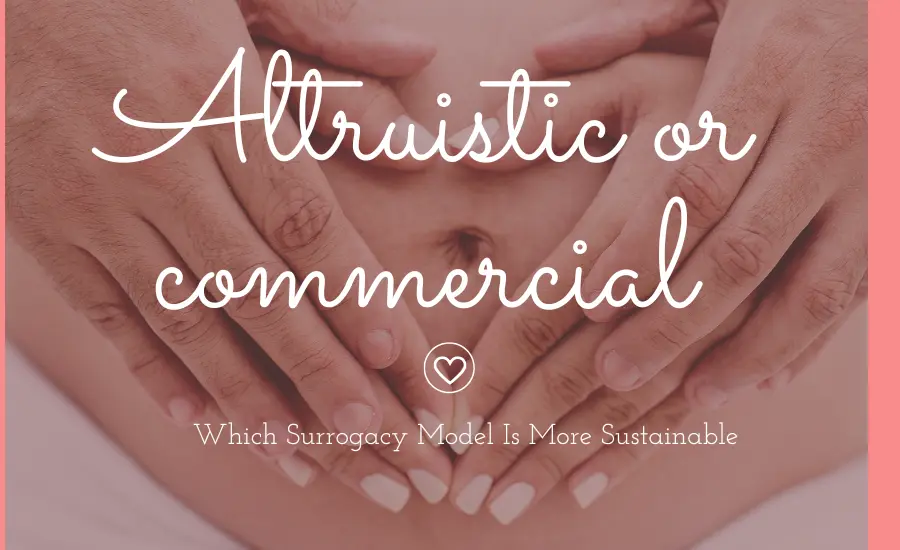Surrogacy is a process that doesn’t need a formal introduction these days. While providing a perfect path to parenthood, this practice has helped numerous people and individuals achieve their long awaited dreams. That said, two different models predominate on the surrogacy scene: namely commercial and altruistic surrogacy.
Also, each of them has ethical challenges, advantages, and drawbacks that lead people to argue whether one is more long-term sustainable.
Knowledge of the Surrogacy basics
Understanding the basic differences between altruistic and commercial surrogacy helps one to appreciate the merits and drawbacks of each.
Altruistic surrogacy
Under this kind of surrogacy arrangement, the surrogate does not get any financial benefits other than what is related to the pregnancy and the medical bills. Often seen as an act for noble cause, this process is more about surrogate volunteering her services to help another couple or person have a child.
Commercial surrogacy
The surrogate in commercial surrogacy is paid for her time, effort, and physical toll from pregnancy. Moreover, this payment is effectively handled as a sort of remuneration for the service of bearing the child and it is beyond the actual expenses of medical treatment.
Altruistic Surrogacy: advantages and drawbacks
Advantages of altruistic surrogacy
- Ethical and Moral concept
Because it emphasizes compassion and selflessness, altruistic surrogacy is sometimes regarded as the better moral choice. Moreover, usually close friends or relatives of the intended parents, surrogates in these agreements are driven by love and a desire to serve rather than money.
- Lowers the exploitation risk
Particularly in economically underdeveloped areas, altruistic surrogacy reduces the possibility of exploitation as there is no financial reward involved. This concept lessens worries about coercion by avoiding the prospect of women feeling under pressure to become surrogates because of financial problems.
- Increased emotional connection
Oftentimes, altruistic surrogates have personal connection with the intended parents. Stronger emotional ties resulting from this can help the surrogacy process to be more personal and encouraging. Over the process, both sides could feel more at ease and trust one another.
Drawbacks of Altruistic Surrogacy
- Restricted accessibility
Lesser surrogates come as one of the biggest negatives of altruistic surrogacy. Moreover, finding someone ready to carry a child for nine months simply out of kindness is far more difficult as there is no financial motivation and sometimes results in extended wait times for intended parents.
- Increased emotional stress
Although altruistic surrogacy is driven by compassion, still the emotional load can nonetheless be somewhat heavy. Moreover, the weight of the obligation may overwhelm the surrogate, so conflicts might develop especially in cases with unclear prior expectations. Should the intended parents or the surrogate fail to satisfy emotional requirements or have differing views on the procedure, the relationship may sour.
- Financial Challenges for Surrogates
Although altruistic surrogacy usually pays for medical bills, the surrogate can still have financial difficulties regarding time off from work, lost income, or other unanticipated expenses. On the other hand, financial strain resulting from this could compromise the whole experience.
Commercial surrogacy: advantages and disadvantages
Commercial Surrogacy’s Benefits
- Surrogate Availability
Since the financial pay is an incentive, commercial surrogacy usually draws more women ready to be surrogates. This simplifies the search for surrogates for intended parents, therefore accelerating the beginning or growth of their family.
- Acknowledging the Surrogate’s role
Both physically and emotionally demanding, pregnancy is acknowledged by commercial surrogacy through financial reward. Along with paying for her medical bills, the surrogate is getting paid for the time, work, and physical sacrifice required in carrying the kid.
 3.Clearer legal framework and contracts
3.Clearer legal framework and contracts
Usually involving thorough contracts covering all elements of the relationship, from the financial compensation to the obligations of both sides, commercial surrogacy involves legal clarity. By giving the intended parents and the surrogate additional protection, these agreements can help to lower legal conflicts and misinterpretation.
Drawbacks of Commercial Surrogacy
- Ethical Issues
The main challenge against commercial surrogacy is that it sometimes treats childbirth like a commodity. Turning pregnancy into a transactional agreement, according to critics, diminishes the surrogate to a service provider, which can seem degrading and raise ethical concerns about exploitation.
- Risk of exploitation
Commercial surrogacy can cause circumstances whereby women feel pressured into becoming surrogates for financial benefit in areas where poverty is rather common. In nations with limited laws, where agencies or intended parents could exploit women, this is especially troubling.
- More Legal matters
Although commercial surrogacy usually entails more formal contracts, it can also result in complicated legal disputes, particularly in nations or states where surrogacy laws are not well-established or contradicting. Resolving the matter can get difficult if things go wrong, say the intended parents refuse to receive the kid or the surrogate changes her mind.
Sustainability of both models
Regarding the sustainability of surrogacy models, we should consider which method would be better for all the long term participants—that of the intended parents, the surrogate, and the child. In this perspective, sustainability also encompasses ethical consequences of every model as well as social and legal elements.
- Societal Effect
Since the surrogate is helping to build a family just out of compassion, this kind of altruistic surrogacy promotes community and giving. Its restricted availability, however, makes it unable to satisfy the growing need for surrogacy in many different countries.
Socially, it depends much on personal relationships, which might not be realistic for everyone. Although contentious, commercial surrogacy satisfies the rising need for surrogates by offering cash rewards. Although it can be considered as a more scalable solution, especially in nations with less government control, it runs the risk of helping women’s bodies to become commodities.
- Legal and Ethical Structure
From an ethical sense, altruistic surrogacy fits with ideas of mutual respect and altruism. It lowers the potential of exploitation, but it also frequently lacks the formal contracts and legal protections that define commercial surrogacy agreements. This can complicate conflicts’ resolution. Particularly in nations or states where the practice is controlled, commercial surrogacy presents clearer legal rules and protections. But, especially in cases of inadequate control, it can cause moral questions regarding financial drive and exploitation.
- Psychological and Emotional Well-Being
Although altruistic surrogacy could strengthen emotional ties between the surrogate and the intended parents, it also has the possibility to cause emotional difficulties. Should expectations be vague or if the surrogate grows overly connected to the kid, the situation can be emotionally taxing for all those engaged.
By contrast, commercial surrogacy sometimes handles the arrangement more like a business transaction. This might lead to a more emotionally detached procedure, which can be advantageous in some situations but might also come out as cold or indifferent to some. Still, it usually results in less emotional conflict as the connection is defined by exact legal language.
Which model is more sustainable?
Both commercial and altruistic surrogacy have advantages and drawbacks; the issue of sustainability is not readily resolved. Though its restricted availability and possible for emotional hardship make it less practical for many, altruistic surrogacy may be ethically perfect, encouraging compassion and lowering exploitation risks.
Conversely, commercial surrogacy raises questions about commodification and exploitation even if it is more easily available and provides explicit legal protections. Long-term sustainability-wise, the ideal balance might come from a controlled commercial surrogacy model under close inspection.
It meets the demand for surrogacy and reduces the possibility of exploitation by means of ethical standards and well defined laws. For those who can locate eager altruistic surrogates, however, the emotional and ethical advantages of altruistic surrogacy are indisputable. That said, strong legal systems, ethical behavior, and an emphasis on the welfare of all the involved parties—especially the surrogate and the child—define ultimately the longevity of either model.





No Comments